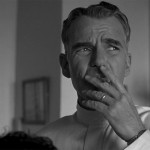I’m the wrong person to write about No Country for Old Men. It’s exactly the film I was expecting, so I’m not sure why I came away from it so disappointed. The crowd had something to do with my reaction, I’m sure. As with Cronenberg’s A History of Violence, which I saw here two years ago, also at the massive Ryerson auditorium, I was surrounded again by viewers who laughed at and applauded the bone breaking and blood splattering. I don’t blame them, really. The Coens give Javier Bardim many of the best lines. His ruthless murderer, Anton Chigurh, has an irresistible charisma, which I’m sure will be interpreted as the seductive power of Evil or something. But I just don’t really care. It’ll win a million Oscars.
I deliberately scheduled several films this year from South America, and also films by young female directors. I think I’m in search of another Lucretia Martel. Encarnacion is Anahi Berneri’s second narrative feature, following 2005’s A Year Without Love, which I’m now curious to see. I enjoy finding films like Encarnacion at TIFF — small character pieces that get the details right. Erni, the film’s protagonist, fits somewhere in that long line of movie heroines who, having reached a certain age, find their beauty fading and their place in the world less secure. I couldn’t help but think of All About Eve, Opening Night, and All About My Mother. Twenty years past her heydays as a calendar pin-up and B-movie queen, Erni now lives alone in Buenos Aires, where she continues to hustle for work on television and in commercials. The dramatic line of the film takes her back to her home town, where she reunites with her disapproving sister and helps to initiate her beloved niece into adolescence. The strength of the film, though, is Silvia Perez’s performance as Erni. A character who could very easily be made maudlin or pathetic has, instead, a curious grace and independence. I love the scenes between her and her occasional lover. A kind of Third Wave hero, she visits and leaves him at her own will.
Last summer, Nick Rhombes offered a couple fun posts about the “radical beauty” of contemporary CGI spectacles. Watching Superman Returns while listening to his randomly shuffling iPod proved an interesting experience, he writes. “My theory is that we don’t see the beauty and artistry of these CGI films because we have never really learned how to appreciate them. Watching them with random music frees us from the prison-house of narrative compulsion; we see them with new eyes. With open eyes.” When I wasn’t laughing at the ridiculous trainwreck of a film that is Elizabeth: The Golden Age, I was thinking of Nick’s posts. There comes a point when these Hollywood picture shows become so incoherent, when the camera movements become so unmotivated, and when the performances become so irrelevant that there’s nothing left on screen but pure Surrealist spectacle. And people say avant-garde cinema can’t find an audience.
Wavelengths concluded this year with a performance of Bruce McClure’s Everytwo Circumflicksrent…Page 298. Before the screening, McClure passed out ear plugs, telling us that he had come to accept that loud noise was an essential component of his process but that he recognized others might not be so disposed. He also expressed an interest in the ways that audiences choose to modify their experience of art — wearing ear plugs to rock shows, for example. His performance featured two modified projectors, each displaying a small circle of light that flickered and shifted focus. The soundtracks of each film had been altered by hand, and the rhythmic loops generated by them were then processed through two guitar pedals, which McClure “played” live. The result was overwhelming — loud, disorienting, hypnotic. At the risk of slipping into cliche, I would call it a performance of elemental cinema: sound and light projected in time. It was a great way to cap the Wavelengths programs.

